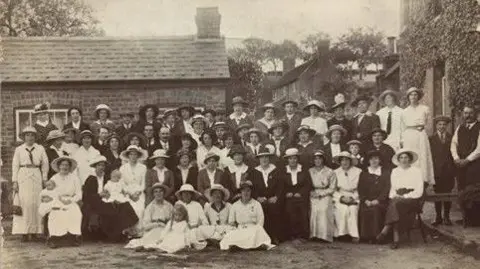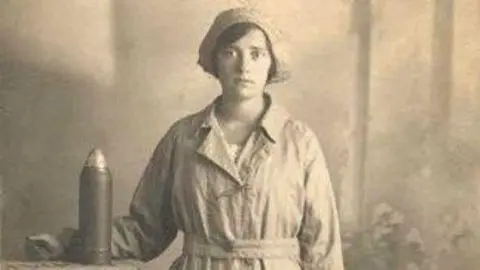Statue to honour Canary Girls at former factory site
 Gloucestershire Archives
Gloucestershire ArchivesA statue is being erected to honour the women who risked their lives to provide frontline ammunition during the wars.
The Canary Girls were British women who worked in munitions factories during World War One and World War Two.
They were known colloquially as canaries because their skin turned yellow due to toxic jaundice caused by the phosphorus used to make TNT, often leading to premature deaths.
Gloucester City Council wants to install the statue near the site of Naas Lane Farm in Quedgeley, where at one point 6,364 people, mainly women, were employed at the National Filling Factory No.5.
The workforce filled millions of shells and cartridges at the factory before operations ceased when the armistice with Germany was signed in November 1918.
The buildings were eventually demolished between 1924 and 1926, but Gloucester City Council now wants to look into the financial viability of a proposed statue near the site.
Councillors unanimously backed a motion brought by Cllr Alastair Chambers, which aims to recognise the valiant effort of Canary Girls.
 Gloucestershire Family History
Gloucestershire Family HistoryHe said: “Not many people know in our country, let alone our city, of the many sacrifices of thousands of women in our city who gave the greatest sacrifice anyone could ever give.
“For the thousands of women working at the munitions factory there was a danger in the air. They were working with TNT and very poisonous substances that caused toxic jaundice that turned your skin, hair and teeth yellow.
“It showed up quicker with women with dark hair and they became known Canary girls. This is about understanding what the women did to help the war effort.”
The council will seek funding through external bodies such as the National Lottery, Arts Council and other grant facilities so that costs are not covered by the taxpayer.
Follow BBC Gloucestershire on Facebook, X and Instagram. Send your story ideas to us on email or via WhatsApp on 0800 313 4630.
